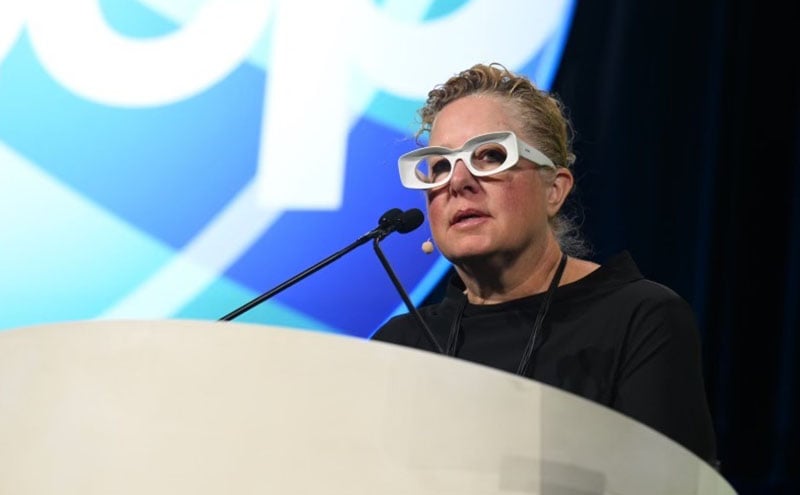Heather E. McGowan opened the ACEP24 general session Sunday by telling a story of a patient in the emergency department experiencing a massive gastric bleed of unknown origin. Physicians began mass transfusion protocol but were still struggling with the cause as the patient was being transferred to a higher-level trauma center due to hemorrhagic shock.
Ms. McGowan told of a physician who approached the patient’s wife, handed her a drawing of a stomach and said, “I’m only a resident, but I think this might be Dieulafoy’s Lesion.”
After more than two days, four hemostatic clips and 25 units of blood, the patient lived to report a happy ending to this near-death experience to attendees at ACEP24.
“That patient was me,” Ms. McGowan told the crowded ballroom. “When I say, ‘thank you’ for what you do, I mean it. This is what you do every day, and you’re in the room in the moments that matter the most.”
Ms. McGowan, who said the young physician’s diagnosis was right, spoke about the Future of Work in Emergency Medicine and touched on social change and how it has impacted work. But the renowned futurist also talked about how work has changed in the past 100 years, particularly how humans are getting their sense of value more from work today. That leaves less time for clubs, social gathering, religious affiliations and involvement in our local communities. Work, she said, has become a place to fill that gap.
That switch in focus can leave a sense of loneliness that manifests itself as a health threat.
It also can lead to anger, and us vs. them attitude and a lashing out not seen at such a level since the 1920s compared to today.
“Loneliness is a threat to our species,” Ms. McGowan said.
Ms. McGowan’s take on the future of work focused on several categories of data and research – humans and changes in behavior and trends, technology and leadership.
Asking the question, “What’s going on with humans?” is broad, but Ms. McGowan broke it down into the changes over the past 100 years. In the 1920s, there was influenza, while today we have Covid-19. Instead of electricity changing how we do things, today we have artificial intelligence. Social changes have brought about gender fluidity. Politics have changed from a rise in democracy to a recent decline.
For emergency physicians, these changes make human interaction with patients even more important, and trust is at the forefront.
“When somebody comes in to see you in the ER, you're focusing on treating whatever symptom they came in with,” said Ms. McGowan, showing a slide mentioning what else that patient might be going through – including a struggle to adapt to change, worry about geopolitical conflict or terrorism or fear of being replaced by technology. “The symptom is the tip of the iceberg.”
Ms. McGowan’s message related to leadership looked at a survey by Seth Godin, who asked 10,000 people from 90 counties to describe what they loved about their best job. The least number of responses pointed out pay and the ease of the work itself. Slightly more people responded by saying they enjoyed their co-workers and they received useful feedback. In the top half were answers like:
- I surprised myself with what I could accomplish
- I could work independently
- The team built something important
- People treated me with respect
- It was difficult
“I want to point out that ‘it wasn't difficult’ was way lower than ‘it was difficult’” Ms. McGowan said. “People want to do what it is hard. What's emerging, especially in this world, is someone who's humble, someone who's an explorer, collaborative and courageous.”
Ms. McGowan closed by pointing out how much better a lot of things are now than in the 1920s. If we can increase global life expectancy from 50 to 73, reach 67 percent in global internet connectivity and reduce violent crime and improve so dramatically when it comes to poverty, we can create a bright future in the new economy, she said.
Ms. McGowan stressed that human interaction, in the workplace, in the emergency department and in our communities, is still invaluable in the new economy.
“This has never been a better time for us to be optimistic about our future,” she said. “Let's go do these hard things.”



